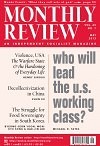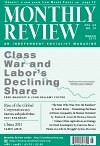Americas
CORE and the Chicago Teachers Union
The success of the Chicago Teachers Union (CTU) strike in September 2012 was a stunning rebuke to the forces of privatization and corporate education reform.… Three years ago when the Caucus of Rank and File Educators (CORE) ran for leadership of the CTU, few would have predicted their ability to turn the union around from six years of do-little leadership into a force capable of taking on a nationally funded, bipartisan “education reform” movement that seemed likely to achieve its goal of weakening and possibly destroying the largest remaining union sector in the United States—public education unions. CORE and the CTU’s success was not due to replacing a weak leadership with a militant one willing to strike, but rather to the creation of a layer of union members in the CTU who saw the struggle as one for what CTU president Karen Lewis calls “the soul of public education.” | more…
Teacher and Parent Solidarity and the 2012 Chicago Teachers' Strike
As Chicago Teachers Union President Karen Lewis made her Sunday late-night announcement that the city’s teachers and paraprofessionals would stage their first strike in twenty-five years, my husband and I were waiting to be interviewed by a local television station to capture our live reaction.… The reporter asked us what were going to do with our kids during the strike. We said that we were bringing our children to our school’s strike line the next day to support our teachers and to teach our children what it means to stand up for yourself in a democracy. We criticized the mayor for supporting test-based pay since tying teachers’ performance to high-stakes tests forces them to narrow the curriculum and teach to the test. We also trashed the mayor’s assertion that class size doesn’t matter and asked if the mayor would want classes of thirty-five or more for his own children.… The interview was absolutely nerve-racking, but when it was over, we were happy that we were able to send that message. As soon as the camera was turned off, the reporter got word from his producer that he “blew it.” Apparently, we were supposed to portray the inconvenienced parents upset with striking teachers. The news producer wanted us to blame the teachers for this impasse in this contract fight, but we did not. We did not play by the rules of their blame game. | more…
Last September’s Chicago teachers’ strike raises critical strategic questions for all progressives and socialists seeking to resist the relentless neoliberal austerity attacks against working people and their communities.… [While in many ways it was a success,] it must be frankly recognized that the CTU’s contract campaign, which culminated in the seven day strike, fell short of achieving its ambitious goals at the contract table. In particular, it was unable to: significantly slow the mayor’s crusade to close scores of schools; halt district funding for mostly non-union, privately run charter schools; stop the lengthening of the school day and year without adequate employee compensation; or prevent the establishment of a teacher evaluation system based to an important degree on unreliable student scores on standardized tests. These less-than-optimal results deserve serious analysis, especially in light of the local’s herculean efforts to transform CTU from a classic, conservative business union to a progressive, even radical, organizing union. Could the strike have achieved more if other strategic choices had been made? Were some demands simply unwinnable? | more…
Reconciling Tensions in Teachers’ Work and Teacher Unionism
“Teachers want what children need—or do they?” Questioning—and rejecting—the slogan used by the American Federation of Teachers (AFT) to fight for collective bargaining in the 1960s, David K. Cohen, a contributor to Socialist Revolution, in 1969 dismissed the progressive potential of teachers’ unions. This article revisits the AFT’s slogan and Cohen’s question, examining tensions between “what teachers want” and “what children need.” The history of U.S. teacher unionism supports the argument that when teachers’ unions adopt a “social movement” orientation and press against the confines of the scope of bargaining embedded in collective-bargaining agreements, the unions minimize tensions between teachers’ rights to organize as workers in defense of their material interests and the unique political and social responsibilities of their work. | more…
Though the U.S. ruling class is divided on some issues—how quickly to attack Iran, how much to cut Social Security and Medicare, whether homosexuals should be tolerated or treated as the spawn of Satan—they are united on one thing: the need to “reform” the public school system. “Reform” means more tests, more market mechanisms, and fewer teachers’ unions.… The agenda has deep bipartisan roots. | more…

Millions of people throughout the world mourned the death of Venezuelan President Hugo Chávez on March 5, 2013. Monthly Review responded at the time with numerous pieces posted on MRzine. We would like, however, to record here briefly something of MR‘s own special relationship to the late president, and what we think constitutes his indelible legacy to socialism in the twenty-first century. MR‘s unique connection to Chávez was largely through the influence of István Mészáros—whose relationship to Chávez stretched back for over twenty years, and whom Chávez called “the pathfinder of 21st century socialism”—and through Marta Harnecker and Michael Lebowitz, who both served as consultants to Chávez.… More than a decade followed in which the socialist revolution under Chávez moved forward, creating huge material, social, and cultural improvements for the Venezuelan population, and vastly increased the power of the people over their own lives through new socialist institutions…. The most vital revolutionary achievement in these years was the introduction of the famous “communal councils”—the general idea for which, as Chávez himself stressed on numerous occasions, was taken from Mészáros’s Beyond Capital. | more…
This article is based upon an interrogation of two books: Gregg Shotwell, Autoworkers Under the Gun: A Shop-Floor View of the End of the American Dream; and Jane McAlevey with Bob Ostertag, Raising Expectations (And Raising Hell): My Decade Fighting For the Labor Movement (New York: Verso Books, 2012). Each book is about an iconic union. Gregg Shotwell writes about the United Auto Workers (UAW), and Jane McAlevey the Service Employees International Union (SEIU). What they report gives us reason for both deep concern and hope concerning the future of organized labor. | more…
The Warfare State and the Hardening of Everyday Life
Since 9/11, the war on terror and the campaign for homeland security have increasingly mimicked the tactics of the enemies they sought to crush. Violence and punishment as both a media spectacle and a bone-crushing reality have become prominent and influential forces shaping U.S. society. As the boundaries between “the realms of war and civil life have collapsed,” social relations and the public services needed to make them viable have been increasingly privatized and militarized. The logic of profitability works its magic in channeling the public funding of warfare and organized violence into universities, market-based service providers, Hollywood cinema, cable television, and deregulated contractors. The metaphysics of war and associated forms of violence now creep into every aspect of U.S. society. | more…
Marge Piercy is the author of eighteen poetry books, most recently The Hunger Moon: New & Selected Poems, 1980–2010 from Knopf. Her most recent novel is Sex Wars (Harper Perennial) and PM Press has republished Vida and Dance the Eagle to Sleep with new introductions. | more…
The name “Walter Rodney” has receded from public memory in the last few decades. Only yesterday, it seems to this reviewer, Rodney was the most promising young political scholar of Afro-Caribbean origin, influential from parts of Africa to Britain and North America, not to mention his home Guyana, as well as Jamaica, Trinidad, and other anglophone islands. He was revered: great things were expected of him, as great things were expected of the new phase of regional history in which independence had been achieved and masses mobilized for real change. | more…

America’s latest war, according to renowned social critic Henry Giroux, is a war on youth. While this may seem counterintuitive in our youth-obsessed culture, Giroux lays bare the grim reality of how our educational, social, and economic institutions continually fail young people. Their systemic failure is the result of what Giroux identifies as “four fundamentalisms”: market deregulation, patriotic and religious fervor, the instrumentalization of education, and the militarization of society. | more…

The history of capitalism is replete with cases of successful captains of industry who, suddenly concerned with their place in history, decide to write a book celebrating their achievements, while articulating a new philosophy of philanthropic capitalism—usually with the help of a ghostwriter or “collaborator” of some sort.… [In this genre] is a new book, Conscious Capitalism: Liberating the Heroic Spirit of Business, written by Whole Foods Market co-CEO John Mackey in collaboration with Bentley University professor of marketing Raj Sisodia.… [I]n spite of all the references to a new form of “heroic capitalism,” which cares about employees and customers, Mackey, like most of his class, is a strong proponent of the most extreme forms of neoliberal exploitation. Both in Conscious Capitalism and in his public actions he has shown himself to be virulently anti-union, priding himself on keeping Whole Foods Market 100 percent union free, and slashing the wages of his workers even as profits have increased. | more…


